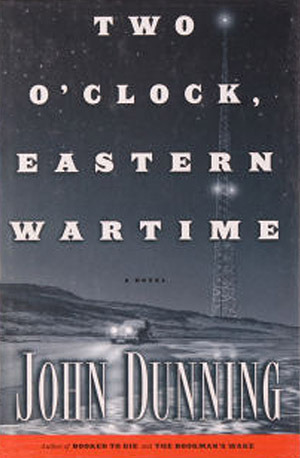About this item
It's the summer of 1942. Bombs are falling on Britain, daylight saving time has given way to wartime, and radio is in its prime. In Regina Beach, on the New Jersey coast, a troupe of gallant artists explores the promise of this exhilarating medium for WHAR, creating programming to entertain and inspire a nation in its dark hour. Enter Jack Dulaney, writer, and Holly Carnahan, singer, determined to find Holly's missing father. As Jack discovers his talent for creating radio dramas, he also begins to suspect that a Nazi spy is operating at the station, and that Carnahan's fate may be linked to an English actor who walked out of the radio station six years ago and was never seen again. It is a link some will do anything to hide – including commit murder.
About the Author
John Dunning
John Dunning was born in 1942 in Brooklyn, NY. He was raised in Charleston, SC, is married, and has two adult children. John always wanted to write, but was a poor student. He left high school in the tenth grade, partly because of an inability to concentrate and absorb lectures. Several years ago he was diagnosed with attention deficit disorder (ADD) , a malady that could not have been imagined in the glorious 1950s. "This may explain my long affection for typewriters," he says. "Unlike a computer, a great old manual typewriter was an honest machine. You did your work, it did its work. There was no sneaky nonsense, no hidden screens that popped up and wouldn't go away, and at no time in my 35 years as a writer did I ever 'lose' anything because I hit a certain key, failed to hold my mouth right, or sneezed at the wrong moment. "John felt he should be a poster boy for ADD. Often the inability to concentrate demanded eight or ten hours of effort for two good hours of work. Sometimes it leads a writer away from his story, causing a month's worth of drifting, rambling around, groping. "In those times I really have to work to get my story, whatever it is, back on track. "John got a GED certificate from the state of South Carolina in the early 1960s. "Historically, it's an interesting document--not because it's mine but because it states that I am the equivalent of the average white high school grad in the state. Now if that's not an official admission that those old 'separate-but-equal' doctrines never worked, what is?"I was a raging failure early in life. Quit high school, then got kicked out of the Army with a broken eardrum after only two weeks, went on to work in a Charleston glass shop for $1.05 an hour, and looked to be on a fast track to nowhere."In 1964 I made my break with Charleston, came to Denver with some friends, worked in a glass shop here for a time, then got on the racetrack and went with the horses for two years. I worked for horse trainers in Denver, Idaho and California, finally hitting the 'big time' at Santa Anita Park in Arcadia, CA. This was a magic time in my life."In 1966 I got a job as a clerk in the library at The Denver Post, which was then the city's afternoon daily. Eventually I became copy boy on the newspaper, and from that I began writing stories. Finally I was given a trial run as a reporter and soon was put on the newspaper's three-man investigative team."This only goes to prove that the hardest thing about any job is getting it."I was a collector of old-time radio shows for 30 years. I grew up with this stuff. It was like collecting part of my own life. I parlayed that into a weekly radio show, which I hosted on Denver radio for more than 25 years."I worked in politics for a while: campaign press secretary to candidates for mayor of Denver, U.S. Senate, and House of Representatives. I tau
More about
John Dunning »
Report incorrect product information.


